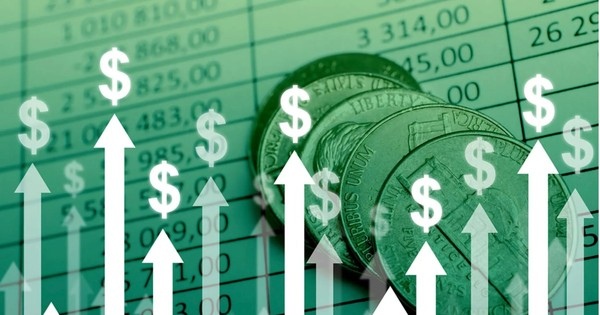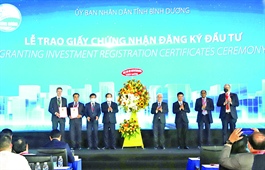Inflation not a domestic problem in Vietnam
Inflation not a domestic problem in Vietnam
Although the economy in Vietnam is under great pressure with rising global inflation, a general assessment of the situation in Vietnam shows that inflation is not much of a domestic problem.
Illustrative photo. |
Inflation in Vietnam currently does not warranty an increase in interest rates or tightening of currency. At present, Vietnam is in a more favorable position than many other countries in the world.
No undue pressure
In a conversation with Saigon Investment, Dr. Ho Quoc Tuan from the University of Bristol, commented that when talking about global inflation, the first factor that comes up is the increase in the price of energy and raw materials across the world which have been greatly affected by the Russia-Ukraine war. Among the factors that are affecting the most are energy prices of crude oil and gas. Analysts in this field have said that even with the US President visiting Saudi Arabia, the ability to deal with energy supply is still very difficult. Currently, the US Congress is trying to come up with policies to encourage domestic production of shale oil, but they are also not too optimistic.
Dr. Ho Quoc Tuan said that this means that the supply cannot be resolved this year and the possibility of a sharp increase in oil prices will raise interest rates even more strongly to control inflation. This is also the reason to expect the US Federal Reserve (FED) to raise interest rates. Inflation in the world is still continuing to rise, however, it will eventually peak at some point this year, with less possibility of it prolonging further.
Dr. Ho Quoc Tuan feels that in such a context, Vietnam's inflation problem is not too big. Vietnam is in a more favorable position than many other countries. When countries face inflation in raw materials, labor costs increase sharply, and many people withdraw from the labor force. Vietnam does not have such a problem, although some industrial units may be facing similar problems to the world, but on the whole people are still going to work. This is an extremely strong buffer to limit the rate of increase in labor costs and it also helps the economy to work.
Dr. Truong Van Phuoc, former acting Chairman of the National Financial Supervisory Commission, also said that there is a big difference between inflation in the world and inflation in Vietnam. Vietnam is proactive in food and can manage prices in public services, while the disruption of the world food supply chain determines inflation in the West. US economists use the theory of background effects in statistics to show that US inflation this year will adjust. Specifically, the average inflation this year will drop to 4.3%, and next year to about 2.7% to 2.8%. Based on the different inflation effects in the West and Vietnam, in essence, Vietnam's inflation is not too much of a problem.
Interest rate hike unnecessary
Dr. Tran Du Lich, an economist, said that Vietnam's current macro policy must solve an equation of four unknowns, which include GDP growth, inflation control, unemployment reduction, and net exports. In this the issue of inflation is most worrisome, but irrespective of this not all policies should be tightened. Specifically, Vietnam cannot tighten the currency and increase interest rates as per some recent proposals. An economy that fails to grow is much more complicated than inflation. While such tightening measures cause an economy to go into recession, inflation is reason for stagnation. Vietnam's economy is an import economy, putting the case to fight inflation by tightening credit and increasing interest rates while still importing inflation.
Dr. Le Dat Chi, from the Ho Chi Minh City University of Economics, commented that it is true that global inflation and Vietnam's inflation are very different. Therefore, it is necessary to look at the actual nature of things. From a scientific perspective, updated studies show that data before September 2021 shows that inflation in the world was a major contributor to monetary policy, because G7 countries had a whole decade of expansion of monetary policy. However, data from September 2021 onwards shows that the currency is no longer to blame. Hence, it is necessary to properly diagnose the cause of the disease, and the main cause of the disease of the current global inflation is the disrupted supply chain.
While Vietnam is somewhat proactive in these issues, the impact on the Vietnamese economy is there but very low. In terms of interest rates, real interest rates in countries around the world are very negative, while Vietnam's real interest rates are showing positive. In 2011, Vietnam's inflation was high, and it was recommended to keep the real interest rate positive to benefit the people, but now the real interest rate is positive. This means that the interest rate correlation with inflation in this context in Vietnam is acceptable. Therefore, it is impossible to follow the theory of raising interest rates to control inflation.
Dr. Ho Quoc Tuan also does not support the view of raising interest rates and tightening credit in the current context. Because Vietnam's economy is an economy that needs capital and needs to invest in infrastructure. To grow the economy, we can take advantage when China is closing, as well as let the world find how Vietnam strongly overcame the pandemic wave. Increasing interest rates does not solve Vietnam's problem when Vietnam's current inflation level is not large.
Countries have spent a huge amount of money on their people, such as Britain, which is currently continuing to spend money, thus leading to more inflation. In the previous period, Vietnam was also spending but the amount was much smaller, and the public spending package was very large. Imported inflation so far has not had a significant impact on Vietnam. Especially, with the Vietnam dong moving very closely with the US dollar, while the US dollar has appreciated a lot compared to other currencies. Vietnam is moving parallel to the current strong appreciation of the currency, which has formed a buffer to deflect the ongoing import inflation in many other countries that has not had much effect on Vietnam.
























